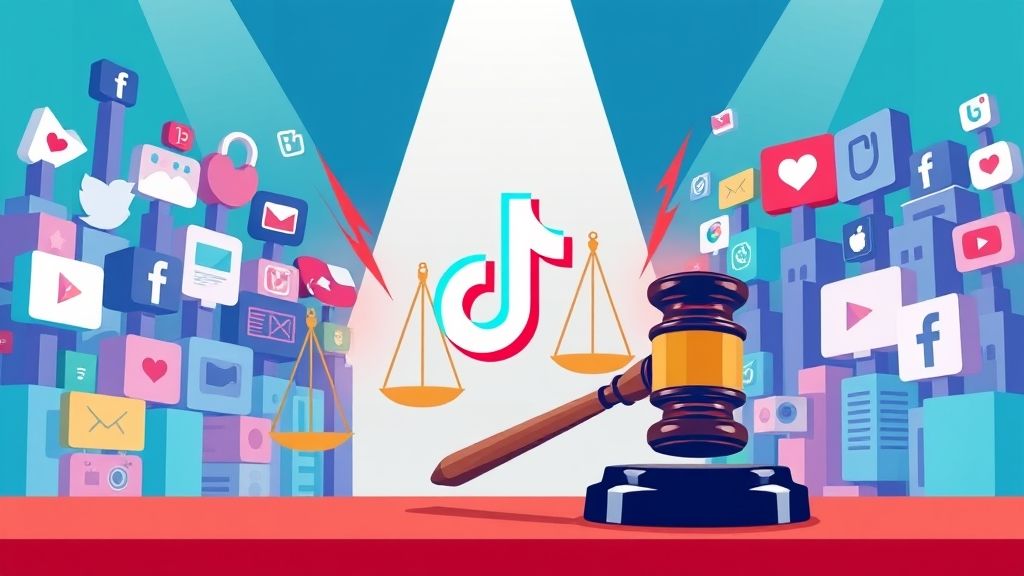
Legal and Business Implications for the TikTok Ban
The Supreme Court’s recent decision to uphold the Protecting Americans from Foreign Adversary Controlled Applications Act (the Act) has sent shockwaves through the business community, particularly for brands, influencers, and marketers heavily reliant on TikTok. With a potential U.S. ban looming unless ByteDance divests its ownership of the platform, businesses face the daunting prospect of losing access to one of the most dynamic and engaging social media ecosystems. Beyond the legal and national security debates, the implications for social media strategies, consumer engagement, and digital advertising are profound. In this post, we’ll explore how the TikTok ban could reshape the social media landscape and what businesses can do to adapt to this rapidly evolving environment.
For anyone interested, the SCOTUS opinion is [here] (https://lnkd.in/gVV2WqXZ). Below is a summary of Key Points, Legal and Business Implications.
1. Legal Rationale
-
What is the Act? The Foreign Adversary Controlled Applications Act aims to prevent the Chinese government from accessing sensitive data of U.S. users, addressing national security concerns about espionage and data misuse.
-
Why the Act Applies to TikTok? The Court recognized TikTok’s role in expressive activity and the burden the ban places on content creators and users. However, it found the Protecting Americans from the Act’s provisions justified under intermediate scrutiny due to the substantial government interest in national security. The Court further found the Act is narrowly tailored to address these concerns without unduly burdening speech, and that the conditional ban on TikTok, pending a qualified divestiture, is a proportionate response to the identified risks.
2. Legal Implications
-
For Tiktok ByteDance must sever ties with TikTok to continue operating in the U.S. or face a ban.
-
For the Future The U.S. government will have increased oversight and control over applications deemed to be controlled by foreign adversaries, potentially setting a precedent for future regulations on other foreign-owned applications. This decision may also embolden Congress to enact similar legislation targeting other foreign-controlled applications, impacting how international tech companies operate in the U.S.
3. Business Implications
How Marketing Teams Can Prepare for a Potential TikTok Ban
If your small business marketing strategy relies heavily on TikTok, preparing for a potential ban is crucial to maintaining audience engagement and protecting your investment. A U.S. ban on TikTok would force marketers to rethink their approaches, but proactive steps can help mitigate risks. Here’s a checklist to ensure your brand remains competitive and visible in the social media marketing landscape:
-
Diversify to other platforms
Explore alternatives like Instagram Reels, YouTube Shorts, and Snapchat Spotlight. These platforms offer similar short-form video formats and cater to large audiences, making them excellent choices for small businesses looking to connect with users. -
Notify your TikTok followers
Notify your TikTok followers of your other social media accounts. Use Tiktok, email and other platforms (Linkedin, Instagram, Twitter, Facebook) to inform your audience about the change and where they can continue to engage with your brand. -
Repurpose existing TikTok content
Don’t let your creative assets go to waste. Transform TikTok videos into content for platforms like Instagram, Facebook, and YouTube. This ensures that your social media content marketing efforts continue to deliver value. -
Adjust content format and style
Tailor your videos to suit the unique audience preferences and algorithms of each platform. For instance, Instagram marketing may require polished visuals, while YouTube advertising can support longer-form storytelling to boost engagement. -
Back up all TikTok content and analytics
Protect your content and insights by downloading your TikTok videos, captions, and analytics. Having these resources backed up ensures continuity in your social media strategy, even if TikTok is no longer accessible. -
Analyze TikTok performance metrics
Download and review your ad performance data to uncover what resonated with your audience. Use these insights to refine campaigns on other platforms, such as Facebook Ads, Linkedin Ads or Google Ads, to reach potential customers effectively. -
Review contracts and agreements
Examine any contracts with TikTok or influencers. This is especially important for startup businesses or small companies that may be locked into long-term commitments. Understanding your obligations will help you navigate potential liabilities tied to a platform shutdown. If you are a Talking Tree subscriber, you can use the legal companion feature to help you understand what you need to do and how to recoup any funds to which you are entitled. -
Reassess advertising budgets
Consider reallocating your budget to other platforms. Testing new avenues can help you find the most effective channels for your small business advertising efforts.
This checklist empowers small businesses and startups to navigate the uncertainties surrounding TikTok while optimizing their social media advertising strategies. If you’re ready to future-proof your marketing efforts, now is the time to diversify and adapt. By addressing these steps, businesses of all sizes can ensure a smooth transition if TikTok becomes unavailable. Proactive planning will protect your brand’s visibility and help you maintain a competitive edge in the ever-evolving world of digital marketing.
Article by Talking Tree, your legal companion in the startup world. Talking Tree is a legal education and resources platform, including a suite of AI-powered tools crafted by ex-FAANG and AmLaw 50 lawyers, designed to help improve accessibility of legal know-hows and quality legal services. Affordable and user-friendly, Talking Tree helps your company automate routine legal tasks so you can focus on what you do best—building something amazing. Because legal doesn’t have to be boring or expensive. Let’s make law accessible together.
